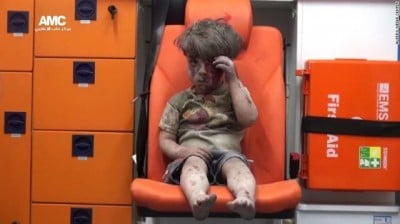Children, the Media, and Political Agendas

The image of 5 year-old Omran Daqneesh rescued from the rubble in the aftermath of a devastating airstrike in Aleppo on 17 August 2016 has reverberated around the globe. Every major media outlet— from the New York Times and the Wall Street Journal to the BBC and Al-Jazeera — has highlighted the picture. It shows a little boy “sitting in an ambulance after the attack, his face, arms and legs caked in blood and dust…” It has become “a symbol for the suffering of children in Syria’s brutal five-year conflict.”
However, Chinese State broadcaster, CCTV, has suggested that “the video may have been partially staged and criticized the way it was used to stir pro-rebel sympathies.” The footage of Omran was released by a group called the White Helmets which, it is alleged, is closely linked to the British military. The author of the footage Mahmoud Rslan, who describes himself as a war journalist and activist has ties to the Harakat Nour al-Din al-Zenki, a rebel group which in July circulated a video showing the beheading of a 12 year-old Palestinian boy. It is said that the group had also conducted kidnappings and torture of journalists, aid workers and civilians in Aleppo. It was considered a “moderate” rebel group by the United States and received weapons from it.
It is significant that initially segments of the Western media blamed the airstrike that injured Omran upon the Russian air force. Russian authorities not only denied the baseless allegation but also accused the Western media of “cynical use of this tragedy in anti-Russian propaganda material.” They argued that “the damage shown in the footage published by world media outlets indicates a blast less powerful than that produced by an aerial bomb, considering that some of the glass in nearby buildings was not shattered.” They instead suggested “that it may have been caused by a mortar shell …”
The cynical manipulation of tragedies in the Syrian conflict has occurred on numerous occasions. One other example that also featured a small boy was the case of 3 year-old Aylan Kurdi who was drowned off a Turkish beach on 2 September 2015 as he and his family sought to cross the Mediterranean to reach Europe. The media had hoped that the infant’s death would expose the cruelty of the Bashar Assad government in Damascus and persuade the Western public to endorse direct, active US led military intervention in Syria aimed at ousting Bashar. It did not happen. Instead, Europe was forced to re-appraise its stance towards refugees and compelled to accommodate a portion of them.
That it is ousting Bashar and not the plight of refugees or the suffering of children that is the primary concern of Washington, London and Paris and their regional allies in Tel Aviv, Riyadh, Qatar and Ankara becomes obvious when one looks at other situations in West Asia and North Africa (WANA) involving children.( The attitude of some Western and WANA governments towards Bashar may be changing ) When a UN report in June 2016 criticised the Saudi-led coalition for killing and maiming a large number of children in its military operations in Yemen, there was no moral outrage against Riyadh among ruling elites in the West or within the region. The media downplayed the UN report and when the UN Secretary-General was pressurised to remove the Saudi-led coalition from the black-list of violators of children’s rights in conflict zones, the mainstream media did not even whimper. It is a reflection of how the media protects certain interests in WANA which in turn are linked to global hegemony.
The media’s biased attitude and its utter lack of moral responsibility becomes even more blatant when one considers what happened in Iraq two decades ago. As a result of Anglo-American sanctions imposed through the UN Security Council, as many as 576,000 Iraqi children may have died in the nineties. Was this stark fact projected through the principal media channels at that time as a way of igniting the world’s conscience so that young lives would not be snuffed out because of the desire of the powerful to control Iraqi oil and strengthen Israel’s position in the region? Did anyone see the victims of these inhuman sanctions on the front page of the Financial Times or through some special programme on CNN?
Perhaps an even worse example of suppression of the truth about the ordeal of the young would be that colossal catastrophe called Palestine. In the 2008-9 Israeli assault against Gaza, a disproportionately high proportion of those killed were children. The same pattern was repeated in the 2012 Israeli bombardment of Gaza. Israel aggression against Palestinian children reached its pinnacle in July 2014. In Operation Protective Edge, of the 1492 Palestinian civilians massacred, 547 were children. There has been no war in recent times in which more than one-third of those killed were children.
And yet how did the media react? Did the media put Israel in the dock? Apart from some principled voices on the margins, the mainstream European and American media were deafeningly silent in the face of this heinous crime against humanity.
All the examples we have provided illustrate a crucial point about the media. When the major media outlets dramatize a particular event especially in relation to children and ignore or downplay other episodes, they are advancing the political agenda of some powerful actor. We should not be deceived. We would do well to remember the words of John Pilger, one of the most honest journalists of our time, “It is not enough for journalists to see themselves as mere messengers without understanding the hidden agendas and myths that surround it.”

